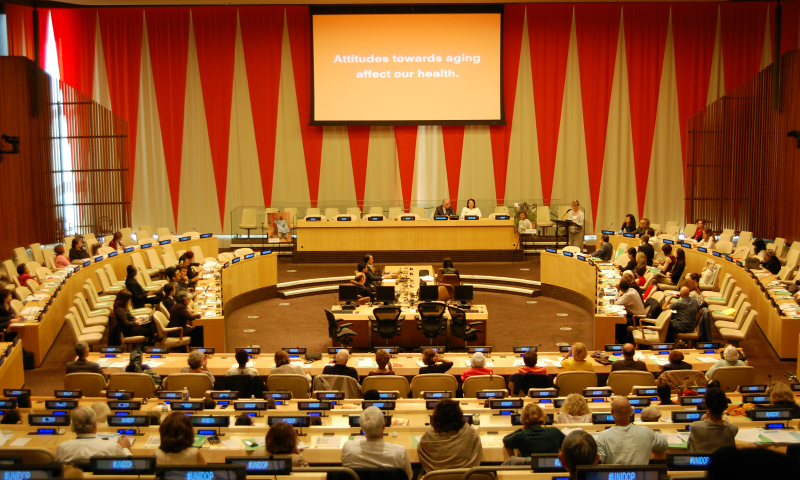
The role of older persons in achieving the Sustainable Development Goals (SDGs) is fundamental but often overlooked, according to Martin García Moritán, Ambassador of Argentina to the UN. The social exclusion of older persons is exacerbated by ageist stereotypes, neglect, violence and abuse, but their inclusion in social development can only lead to positive outcomes. Recognizing that human rights do not end after 60 ensures that we can overcome ageism and discrimination.
But awareness about ageism can get people of all ages to act against it.
Ambassador García Moritán, as well as representatives from the UN, civil society, and other Member States called for an end to discrimination against older persons and to Take a Stand against Ageism. This was the theme of the 26th commemoration of the UN International Day of Older Persons (UNIDOP) which took place 1 October and was celebrated at an event on 6 October in the Economic and Social Council at a UN Headquarters in New York. The event included remarks, video presentations and a panel discussion on the rise of ageism in an ageing world, and what we can do to end the stigma.
UN DESA DSPD Director Daniela Bas noted that, “human rights do not diminish with age.” Ageism affects people of all ages, as it means that older persons are often excluded from social policy frameworks and are denied access to services. Younger people have to take on more burdens if governments do not recognize the rights of older persons. There is a need for global conventions that take a stand against ageism, and action must come from everyone from each age group, together.
The keynote address was delivered by Ashton Applewhite, author of This Chair Rocks: A Manifesto against Ageism. Ageism is as unacceptable as sexism or racism. It disproportionately affects women and legitimizes abuse. Ms. Applewhite called for on the UN to create and adopt a convention on the rights of older persons. A UN Convention would motivate Member States to act, would help investment in infrastructure needed to serve ageing societies, formally recognize this phenomenon and remind the world that human rights do not just disappear with age. Better research that disaggregates data is needed to find out more on what is happening to older persons from diverse backgrounds. It is time for a radical age movement that stands up to ageism and ends the stigma.
But ageism has still increased in recent years, according to World Health Organisation adviser on ageing, Alana Officer. As people age, negative stereotypes associated with certain age groups are internalized. The way we medicalize ageing is significantly associated with negative age stereotypes. Among healthcare workers in a study conducted in the UK, there is a greater likelihood for ageist attitudes because of the way they are trained to treat persons of older age. Ageism can have negative effects on the social policies, questions asked and solutions proposed. But a global coalition against ageism is growing and platforms are being developed to communicate among the anti-ageism movement. Older persons present an incredible opportunity, but this means creating inclusive societies and gaining a better understanding of ageing.

“You’re only as old as how you feel,” said UN General Assembly President Peter Thomson who delivered the event’s closing remarks. People should not be defined by their physical characteristics, especially by how old they look. We live in an ageing world, but it does not have to be an ageist one. The event was organised by UN DESA DSPD, The Permanent Mission of Argentina to the UN and the UN NGO Committee on Ageing.
https://www.youtube.com/watch?v=UYCxAIqjyCA
Follow the online conversation on the UN International Day of Older Persons using #UNIDOP
Learn more about the 2016 UN International Day of Older Persons.
Learn more about our work on ageing at social.un.org/ageing.
Source & Copyright: UNDESA DSPD
 Welcome to the United Nations
Welcome to the United Nations